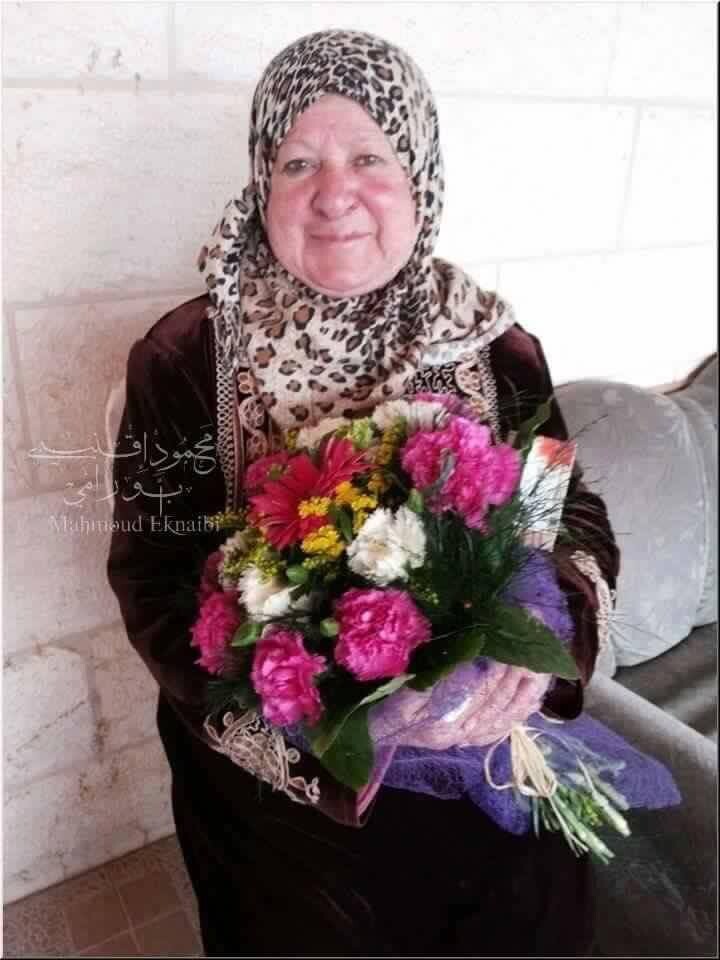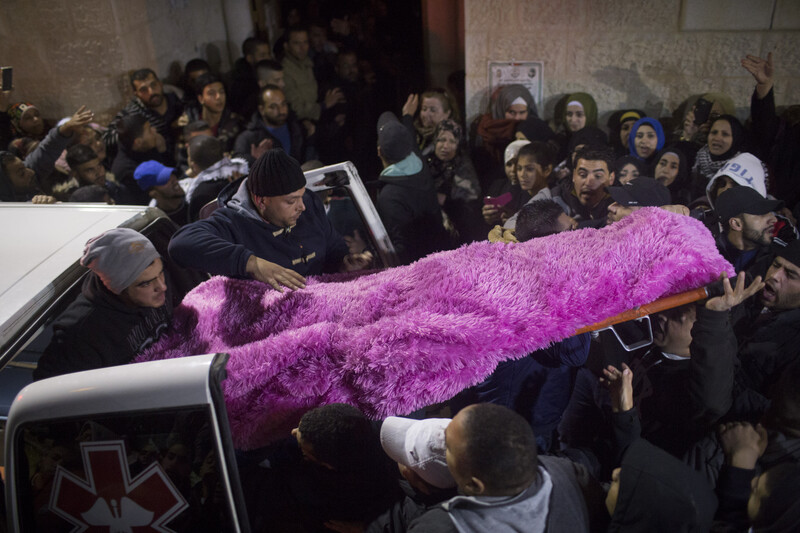Rights and Accountability 24 December 2015

Mourners carry the body of Sadiq Ziad Gharbiyeh during the boy’s funeral in the West Bank city of Jenin on 23 December.
APA imagesThis week Israel transferred the bodies of several Palestinians killed by its forces during alleged attacks in recent weeks and which have been withheld from their families.
The Palestinian health ministry stated on Thursday that 135 Palestinians have been killed since the beginning of October. Almost two dozen Israelis were slain during the same period.
More than half of the Palestinians killed were shot dead during alleged attacks – a result of what the Israeli human rights group B’Tselem condemned as an unwritten “shoot to kill” policy.
The bodies of dozens of Palestinians have been held – including several children – after Israel approved a number of repressive measures in mid-October following two weeks of heightened violence that shows no sign of ebbing.
These measures, including the demolition of homes belonging to family members of alleged assailants, have been criticized by human rights groups as collective punishment that is illegal under international law.
Israel’s public security minister, Gilad Erdan, said at the time that funeral processions of Palestinians killed by Israeli forces turn into “an exhibition of support for terror and incitement to murder.”
The military and intelligence establishment have had divergent views on the policy, and some bodies had been returned on condition that the Palestinian Authority prevent mass funerals, the Tel Aviv newspaper Haaretz reported last month.
Prior to what has been dubbed the “intifada of the knives,” Israel imposed conditions on Palestinian families in Jerusalem stipulating that funerals of slain relatives be limited in attendance and take place late at night.
Hundreds of Palestinian fighters have been buried in Israel’s secret “cemeteries of numbers” over the years, and their bodies have sometimes been used as bargaining chips in prisoner exchange deals.
Last week the rights group B’Tselem described the wihholding of bodies as “patently immoral” and “yet another instance of Israeli authorities’ disregard for the lives of Palestinians – even after their death.”
Palestinians, particularly in the occupied West Bank city of Hebron, which has borne the brunt of Israel’s crackdown on the ongoing uprising, have held frequent protests calling for the transfer of bodies so that their families may bury them.
Children buried
In the last two days, Israel returned the bodies of four children shot dead in the last month.
The Quds news site reported that the bodies of 15-year-old Abdallah Nasasra and 16-year-old Alaa Hashash were transferred on Thursday.
Nasasra was killed at Huwwara military checkpoint near the West Bank city of Nablus on Thursday, 17 December; Israeli police said that the boy had charged at soldiers with a knife.
No Israelis were injured during the incident and a Palestinian ambulance driver said that soldiers prevented medical teams from treating the teen.
Hashash was shot after allegedly attempting to stab an Israeli soldier at the same checkpoint last month.
Samah Abd al-Mumin Abdallah, 18, died last week from her wounds sustained during the same incident. She was sitting in her father’s car when she was hit by a stray bullet after Israeli forces opened fire on Hashash.
And on Wednesday, Israel returned the bodies of two 16-year-old boys – Ahmad Abu al-Rab and Sadiq Ziad Gharbiya – who were shot dead last month.
Abu al-Rab was killed and 17-year-old Mahmoud Kamil wounded on 2 November when Israeli soldiers opened fire at the boys at the Jalameh checkpoint in the northern West Bank, in what the Palestinian Centre for Human Rights described as a “crime of excessive use of force.”
Eyewitness testimony collected by Defense for Children International - Palestine indicates that Ahmad Abu al-Rab was still alive, on his knees and surrounded by Israeli soldiers just before he was killed.
Gharbiya was slain by Israeli forces at a checkpoint near the West Bank town of Abu Dis after he allegedly attempted to stab a soldier on 10 November.
The Palestinian news network Quds published videos of Abu al-Rab and Gharbiya’s funerals.

Palestinians carry the body of Maram Hassouna during her funeral in the West Bank city of Nablus on 22 December.
APA imagesOn Tuesday, hundreds attended the funeral of 19-year-old Maram Hassouna in Nablus.
The university student was shot dead on 1 December after allegedly attempting to stab an Israeli soldier at a checkpoint outside an Israeli settlement.
“She had previously spent a year in an Israeli prison after she was charged with attempting to stab an Israeli soldier at the same checkpoint near Enav settlement two years ago,” the Ma’an News Agency reported.
Another young woman, Rasha Uweisi, 23, was buried in Qalqiliya several weeks after she was shot dead after allegedly attempting to stab soldiers at a checkpoint near an Israeli settlement south of the West Bank city.
Grandmother mourned

Tharwat al-Sharawi in an image circulated on social media.
That same day, Palestinians in Hebron buried Tharwat al-Sharawi, a 72-year-old grandmother who was shot and killed by Israeli soldiers several weeks ago.
Video of the incident shows Israeli forces opening fire on al-Sharawi’s car as it approached them at a moderate speed.
They continued to fire on the vehicle even after it passed them and entered a nearby gas station and no soldier was injured in the incident, according to B’Tselem.
“The video footage indicates that the shooting at al-Sharawi’s car persisted and intensified after she passed the soldiers, even when she no longer posed any danger,” the rights group stated.
Al-Sharawi’s son Ayoub told media his mother had been on her way to lunch at her sister’s house when she was killed and rejected the claim that she had attempted to attack the soldiers at the checkpoint.
Amnesty International determined that Israel’s use of lethal force against al-Sharawi was unlawful even if she had intended to harm the soldiers.
And on Monday, Israel handed over the body of a Palestinian citizen of the country who is accused of killing an Israeli soldier at a bus station in the southern city of Bir al-Saba (Beersheva).
“Muhannad al-Oqbi, 21, from the Bedouin village of Hura, was shot dead on 18 October after killing Israeli soldier Omri Levi and injuring at least nine others, according to Israeli police,” the Ma’an News Agency reported.
Israeli police transferred al-Oqbi’s body at around 10pm on the condition that no more than 50 people attend his funeral, a relative of the slain man told Ma’an.
The relative added that police warned that they would confiscate al-Oqbi’s body if the family did not comply.
Last month Taleb Abu Arar, a Bedouin member of Israel’s parliament, the Knesset, called for the release of al-Oqbi’s body and said that video of the incident “does not prove al-Oqbi’s involvement.”
During the same incident, Haftom Zarhum, an Eritrean asylum-seeker, was killed after he was shot by a security guard and beaten by a mob who mistook him for the perpetrator of the attack.
Indictment and investigation
And on Friday, Israel handed over the body of 14-year-old Hadil Awwad nearly a month after she was slain and her 16-year-old cousin Nurhan Awwad seriously wounded in a Jerusalem market.
Security video of the incident shows the scissor-wielding girls being knocked to the ground and shot at close range before any attempt was made to arrest them.
The surviving teen has since been charged with attempted murder.
Israel’s attorney general has launched an investigation of a police officer over the shooting of Nurhan following “complaints that he shot the terrorist although she posed no danger.”

The body of Hadil Awwad, 14, is carried during the girl’s funeral in Qalandiya refugee camp near the West Bank city of Ramallah on 18 December.
ActiveStillsThough he shot at both Hadil and Nurhan, the police officer is only being investigated for shooting the latter, Haaretz reported.
The officer is the first to be questioned for firing at a suspect during the current wave of violence, according to Haaretz.
Meanwhile, the Palestinian rights group Addameer told the Ma’an News Agency this week that Israel is expected to hand over the bodies of Palestinians from Jerusalem who were slain in recent weeks.
Israel is withholding the bodies of more than a dozen Palestinians from the occupied city, including four children, Ma’an reported.





